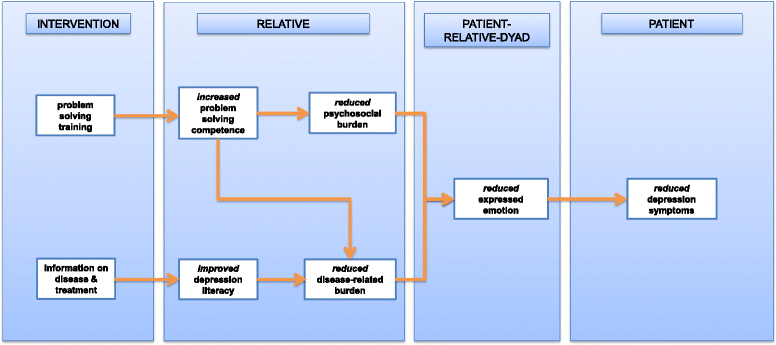Effectiveness of a brief psychoeducational group intervention for relatives on the course of disease in patients after inpatient depression treatment compared with treatment as usual--study protocol of a multisite randomised controlled trial
- PMID: 26497218
- PMCID: PMC4619254
- DOI: 10.1186/s12888-015-0633-4
Effectiveness of a brief psychoeducational group intervention for relatives on the course of disease in patients after inpatient depression treatment compared with treatment as usual--study protocol of a multisite randomised controlled trial
Abstract
Background: Relapses and rehospitalisations are common after acute inpatient treatment in depressive disorders. Interventions for stabilising treatment outcomes are urgently needed. Psychoeducational group interventions for relatives were shown to be suitable for improving the course of disease in schizophrenia and bipolar disorders. A small Japanese monocentre randomised controlled trial also showed promising results for depressive disorders. However, the evidence regarding psychoeducation for relatives of patients with depressive disorders is unclear.
Methods/design: The study is conducted as a two-arm multisite randomised controlled trial to evaluate the incremental effect of a brief psychoeducational group intervention for relatives as a maintenance treatment on the course of disease compared to treatment as usual. Primary outcome is the estimated number of depression-free-days in patients within one year after discharge from inpatient treatment. 180 patients diagnosed with unipolar depressive disorders as well as one key relative per patient will be included during inpatient treatment and randomly allocated to the conditions at discharge. In the intervention group, relatives will participate in a brief psychoeducational group intervention following the patient's discharge. The intervention consists of four group sessions lasting 90 to 120 min each. Every group session contains informational parts as well as structured training in problem-solving. In both study conditions, patients will receive treatment as usual. Patients as well as relatives will be surveyed by means of questionnaires at discharge and three, six, nine and twelve months after discharge. In addition to the primary outcome, several patient-related and relative-related secondary outcomes will be considered and health economics will be investigated.
Discussion: Our study will provide evidence on the incremental effect of a brief psychoeducational intervention for relatives as a maintenance treatment after inpatient depression treatment. Positive results may have a major impact on health care for depression.
Trial registration: German Clinical Trials Register (DRKS): DRKS00006819; Trial registration date: 2014 Oktober 31; Universal Trial Number (UTN): U1111-1163-5391.
Figures
Similar articles
-
Provision of group psychoeducation for relatives of persons in inpatient depression treatment--a cross-sectional survey of acute care hospitals in Germany.BMC Psychiatry. 2014 May 19;14:143. doi: 10.1186/1471-244X-14-143. BMC Psychiatry. 2014. PMID: 24885727 Free PMC article.
-
Study protocol: group-based psychoeducation for relatives of patients with bipolar disorder-a large scale real-world randomized controlled parallel group trial, the R-bipolar RCT.Trials. 2024 May 23;25(1):342. doi: 10.1186/s13063-024-08172-z. Trials. 2024. PMID: 38783322 Free PMC article.
-
Effectiveness of a strength-oriented psychoeducation on caregiving competence, problem-solving abilities, psychosocial outcomes and physical health among family caregiver of stroke survivors: A randomised controlled trial.Int J Nurs Stud. 2018 Nov;87:84-93. doi: 10.1016/j.ijnurstu.2018.07.005. Epub 2018 Jul 28. Int J Nurs Stud. 2018. PMID: 30059815 Clinical Trial.
-
Systematic reviews of the effectiveness of day care for people with severe mental disorders: (1) acute day hospital versus admission; (2) vocational rehabilitation; (3) day hospital versus outpatient care.Health Technol Assess. 2001;5(21):1-75. doi: 10.3310/hta5210. Health Technol Assess. 2001. PMID: 11532238 Review.
-
Psychoeducational interventions in adolescent depression: A systematic review.Patient Educ Couns. 2018 May;101(5):804-816. doi: 10.1016/j.pec.2017.10.015. Epub 2017 Oct 24. Patient Educ Couns. 2018. PMID: 29103882 Free PMC article.
Cited by
-
Effectiveness of family psychoeducation for major depressive disorder: systematic review and meta-analysis.BJPsych Open. 2022 Aug 2;8(5):e148. doi: 10.1192/bjo.2022.543. BJPsych Open. 2022. PMID: 35915980 Free PMC article. Review.
-
An online program with individualized vs automated support for significant others of depressed individuals - study protocol of a randomized controlled trial.BMC Psychiatry. 2022 Jul 28;22(1):511. doi: 10.1186/s12888-022-04035-6. BMC Psychiatry. 2022. PMID: 35902851 Free PMC article.
References
-
- Kessing LV, Andersen PK. Predictive effects of previous episodes on the risk of recurrence in depressive and bipolar disorders. Curr Psychos Ther Rep. 2005;3:123–30. - PubMed
-
- Bitzer EM, Grobe TG, Neusser S, Mieth I, Schwartz FW. BARMER GEK Report Krankenhaus 2011. St. Augustin: Asgard-Verlag; 2011.
-
- DGPPN, BÄK, KBV, AWMF, AkdÄ, BPtK, BApK, DAGSHG, DEGAM, DGPM, DGPs, DGRW, editor. für die Leitliniengruppe Unipolare Depression. S3-Leitlinie/Nationale VersorgungsLeitlinie Unipolare Depression-Langfassung. Berlin: DGPPN, ÄZQ, AWMF; 2009.
Publication types
MeSH terms
Associated data
LinkOut - more resources
Full Text Sources
Other Literature Sources


